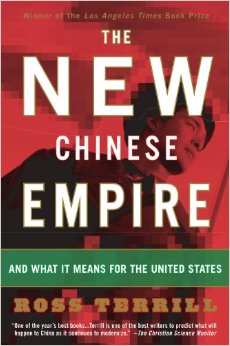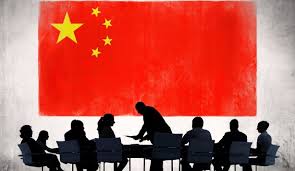 
 字體:小 中 大
字體:小 中 大 |
|
|
|
| 2016/11/30 14:09:02瀏覽353|回應0|推薦5 | |
|
Means For The United States Paperback. This past spring, the outbreak of SARS grabbed the attention of the world. The schizophrenic, paranoid way the Chinese government handled the outbreak perfectly illustrated the danger of a political system unaccountable to its citizens.In The New Chinese Empire, Ross Terrill assesses this government, and the central question it raises: Is the People's Republic of China, whose polity is a hybrid of Chinese tradition and Western Marxism, willing to become a modern nation-or does it insist on remaining an empire? Hanging in the balance are the prospect for freedom within China, the future of America's relations with China, and the security of China's neighbors.This enlightening book is a must-read for everyone doing business in China and all who have a stake in the future of the global world order. 這本書深入地解釋了新的和強大的中國“帝國”,以及它如何影響美國社會和意識形態。它還深入了解中國政府內部工作的心態,並解釋了中國對國內外政策的看法。Terrill的論點將古代中國與今天的中國聯繫起來,把理想主義和現實主義混合在一起,依附於教義,家長主義和對民族團結的迷戀。 Terrill是哈佛政治學博士,借鑒他的專業培訓和多年來訪問中國,以Lucian Pye的話說“偽裝成一個民族的文明”。他描繪了中國的長期未來,而不是文明的衝突,而不是人性和社會變革的普遍性。 Terrill也是傳記的作者,毛澤東在中國首次禁止其對毛澤東的“現實”描寫,然後由人民大學出版社出版成為一個暢銷書。 The New Chinese Empire and What It Means for the United States Terrill's erudition in this latest book is impressive. In it he covers China's millennial history, leaping effortlessly over the centuries between the China of antiquity and the China of today. His mindset seems to have been deeply influenced by his firsthand experience of the power of the Chinese state when he was "expelled from China" in 1992 after an unsuccessful attempt to hold a Beijing hotel press conference with former Tiananmen democracy movement leader Shen Tong (then a student at Boston University). In the present work Terrill writes forcefully, skillfully, and with broad understanding, not limited by the constraints of any one scholarly discipline, as tenure-track academicians are apt to be. In The New Chinese Empire Terrill has gathered and distilled data and insights on China since his first visit there in 1964, displaying just how much his overall perspective on the People's Republic has shifted during his long career as a writer and educator. For example, more than three decades ago he wrote, in 800, 000,000: The Real China (Little, Brown and Company, 1972): "I am . . . against both the "jungle" of capitalism and the "prison" of communism" (p. 234). Now, however, the weight of criticism in The New Chinese Empire is definitely heavy on the communist prison and light on the global capitalist jungle of today.
|
|
| ( 時事評論|政治 ) |














